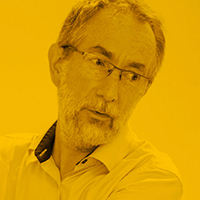As the dust settles on Learning Technologies '19, the Kineo team take a look at the common trends and themes that came out of the two day event.
Paul Westlake 0:00
Welcome to Kineo Stream of Thought a monthly podcast that features informal chat from the Kineo team about all things learning. I'm Paul Westlake, solutions consultant at Kineo. And today now that the dust is finally settled, we're taking a look back and Learning Technologies 2019.Today, I'm pleased to say I'm joined by
Pete May 0:23
Pete May, Learning Platforms Consultant
Steve McKenzie 0:26
Steve McKenzie, Solutions Consultant,
Monika Wojtanowicz 0:28
and Monika Wojtanowicz, LMS consultant.
Paul Westlake 0:32
Well, thanks all. Welcome. So, we're going to talk about Learning Technologies 2019, as I said, but for full disclosure, I maybe should start by saying, whilst you lovely folks with air and working on our stand and having to walk around looking at learntech, I was fortunate enough to be away skiing with the family. So for me, this is an interesting one, because I'm interested to see what you saw and more importantly, what I missed. So I think the big thing to start with is change of location this year.
Steve McKenzie 0:57
Yes, it was the first year that learning technologies was at the XL center, ever in Docklands and moved through away from Olympia. So very much of a larger venue, much more space for everybody for the exhibitors and for those attending. So I think that was very welcome.
Paul Westlake 1:14
It's just an opportunity for stands to get even moving vigorously large!?
Steve McKenzie 1:17
There was certainly, I think some people took full advantage of that, and made their stands even larger. I think it was a much more comfortable venue this year with people with plenty of space to move around. And I think we happen to be near the entrance. So that was good location, a bit of fresh air coming into the venue to
Paul Westlake 1:36
and still keep them in the same format, though of an exhibition open to public, and then you've got conferences upstairs, I'm assuming?
Steve McKenzie 1:43
That's right. Yeah, the conference was still upstairs as it worked out. Same as Olympia. And that is a format that works extremely well. So people can go to the conference. And then between the various presentations, they come down on the exhibition floor.
Paul Westlake 1:57
I guess the obvious first question then is, what did I miss? What what was cool? What what really piqued your interest?
Pete May 2:04
I think there was probably a lot less talk about learning ecosystems. But perhaps more of people taking stock and understanding a little bit more about all of the tools and components that that would go into that ecosystem and trying to do that really well.
Paul Westlake 2:21
So ecosystem is very much the buzzword of last year. Is it fair to say we're now getting people thinking about, what does that actually mean for my business, rather than just banding around a buzzword?
Steve McKenzie 2:31
I'm not so sure that many people are completely comfortable about using the word or the phrase learning ecosystem yet, but there's certainly very focused on getting the most from the resources that they have, and seeing how they might meet the very big demands in their business really.
Monika Wojtanowicz 2:49
I feel like ecosystems, the new ecosystems as LSP or learning experience platforms, which which I think response to the market around, maybe not understanding exactly what ecosystems was all about, but learning experience learner experience, we can all get behind and understand that.
Paul Westlake 3:06
and was that someone pushing like an all in one solution again, or were they the extra bits that add on to that ecosystem to give an overall learner experience?
Monica Wojtanowicz 3:17
I think it was more talking about the capability that each of those systems gives you rather than the physical system itself. Which was, which was great, because it makes it so much more clear what it is that we're aiming for, which is satisfying the learner.
Paul Westlake 3:35
I think people have had some experiences using different systems now, they've experimented with different things on the marketplace. And now they're really trying to decide how they're going to put that into a cohesive solution really, to meet evolving needs within their business. So Pete, you said you saw some elements that you think fit into an ecosystem? So is anything in particular that springs to mind that, you know, maybe you haven't seen before you think might be a really nice fit for people?
Pete May 4:02
Well, I think I wouldn't say I hadn't seen it before. But I saw a lot of kind of curated content libraries, again, all tied in with the kind of learner experience platforms, and a lot of people talking about how they're able to tailor a learning path to specific learners needs, rather than just having, okay, I've got to do my compliance training this year, I better log on to the LMS. And actually try and engage learners with the content, go and find content, have AI that actually is able to say, Well, you've looked at this before, how about this? Do you want to look at that. And I thought that was really intriguing.
Paul Westlake 4:37
So recommendation engines, again, using AI to say, you know, you've looked at this or so and so I think this might be useful. I'm pushing that content. So it's that content that's already already exists in the marketplace if you like so, is it fair to say you saw a move away from content creation or more towards the curation that we've been talking about?
Pete May 4:56
Absolutely, I think so. And I think a lot of smaller companies or startup companies, should I say that are just trying to be really good at what they do rather than trying to be a master of everything?
Monica Wojtanowicz 5:09
Oh, yeah, in the last few years actually in, in learning tech, you see that there is much more people are doing a lot of the same thing. But they're focusing on specific approaches for either a vertical or an industry or a type of learner. And you have a huge choice, really, of apples and apples that you can you can judge one solution over another, and a specific, a specific approach that someone may have for to solve a certain business challenge.
Paul Westlake 5:37
Yeah, I think obviously, I have not gone to this year's show. Obviously, I can't speak for it. But for previous years, I think one of the things I used to like to do was go away from the maybe the massive stand some of the behemoth stands and look at some of those smaller companies, they were say around the edge, or startups a nice way of putting it, you're absolutely right, who were looking at one specific problem that maybe they're trying to solve. So do we see any companies doing that this year?
Monica Wojtanowicz 6:00
I thinka lot of what you saw was quite gimmicky, as well. So a lot around entertaining learners a lot, sort of Netflix like style platforms, and, and VR type of things to really engage people I'm not so sure if if it was just for learn tech that you want to be remembered, as the standard did VR and had Oculus there or whatever. But there was this very memorable, the different styles that I went to people are definitely working on differentiating themselves, one from another.
Paul Westlake 6:32
And that's quite an interesting approach in itself. And it sounds to me like the people are almost starting to say, we need to match what people are already doing at home anyway. So people are using AR and chatbots, and all the rest of its stuff at home. And then maybe we're starting to see more of that coming to you. And we've been talking about this for a number of years. Steve, haven't we, were always catching up. I think so but but people are very budget conscious. I think that was something else that came out very strongly at the show that people are thinking, well, I've got a fixed budget, or it's not even been approved. I'm getting ideas. But I've got to put together a very persuasive business case to secure the funding I need.
Monica Wojtanowicz 7:07
I think also sitting space was very popular this year, everyone seemed to have areas for people to sit down and chat through. And I think that must respond to what we all feel that your legs are tired at the end of the day.
Paul Westlake 7:22
What are some of the feedback obviously, I've been reading a few articles since since coming back off holiday and about how the show went. But one of the things that maybe wasn't such a positive thing is that most, a lot of the vendors now are almost doing their own demos on their own standards, rather than needs to be the breakout areas like the theater areas, right? I'm assuming we still got those at Excel. So surely it just becomes a wall of noise, doesn't it? We're almost compete with each other? I'm afraid. So. Yes, it was who could speak the loudest on occasions, I think and it did become quite disruptive. You could be on one stand on one area, and then really here broadcasts from quite far away. And I think people are trying to outdo each other term in terms of volume definitely. And interesting, something the organizers maybe look need to look at for future years
Steve McKenzie 8:15
I think so it was difficult to have some conversations really with some of our clients who are softly spoken. They couldn't really hear clearly what was what was being said on the stand. So we were almost looking for a quiet area on stand away from some of this this bombardment of sound.
Paul Westlake 8:31
But I understand we had almost a quite area and then went to tell me about the green box. Another Kineo Stand in particular, which is maybe again, a different way of looking at things or trying to offer something different to the client or giving them a different view of maybe the work we do.Yes, very much. So the idea of the green box was that we had a space where we could demo a fictitious project being put together by a global art director, and his team. And it worked extremely well, because a lot of people coming in, and they want to know a little bit more about us. The Kineo experience, so we were able to direct them to this this space where a project was being developed. And you can see firsthand some of the designs and the thinking that goes into creating a project.Yeah, and I think maybe sometimes we need to look at those little differentiators, you know, what, what are we doing differently? Because, again, Monica, is it fair to say you saw a lot of people doing the same thing again, like previous years?
Monica Wojtanowicz 9:24
I think that the underpinning technology seems to be the same. It's just the approach that changes from one from one provider to another.
Paul Westlake 9:33
Okay, and we've talked a lot about very much the platform side of things. So Pete, you're saying about the ecosystems and obviously, you know, Monica has just said the same but do you see anything from maybe a content perspective that we found maybe different or interesting or a different way of working? No? I knew that was coming. No, no, we did. Okay, cool. Bye. scrap that bit! So we talked a lot about the platforms. And it seems to be a lot of push towards platforms, I don't know if that's to do with maybe a lot of our clients are now writing content in house. So you know, previous years, we've seen a move towards where we can do a lot of this in house, let's see which bits we can't do unless use a vendor for that. And again, I was reading an article about, there seems to be a big push towards Spaced Repetition at the moment. And I know there are a couple of vendors there that had apps that literally were just for that one sort of thing, which in in ways it's a good thing, right. So you know, someone's got content, maybe they're writing in house, or maybe someone's got a platform. But the bit that's missing is this one thing about maybe not even app to, for people to test and embed them learning that sort of stuff. So I think it was quite nice to hear that there were vendors there that just identified one problem, and do a really nice job of solving that problem. And again, I think that's the guys around the outside. Yeah. And I again, one of the other things that came up was, I can't remember off the top of my head that the company name, but I'm sure we could put it in the show notes. But it was an idea of almost using AI to be watching what someone's doing on a on a platform. And then if it's aware that they're struggling, so for example, if they're struggling with a formula in Excel, you know, going off in the background and coming back and saying, Well, actually, I found this clip, and this bit of learning. Join me to help you with writing that formula. I mean, that sounds fantastic. Right? Yeah, I mean, you know, I don't know that I'm particularly but it was incredible. The creative people that become, as you say, there were a number of potential vendors around the outside of the hall. And they were very niche in those areas. I think the challenge really, for consumers, though, is just making sense of all this. How do you How'd you find that unit? How do you even know that somebody is working on that? And publicising? You know, publishing that sort of information or making it available? There's a solution there. And I think that's the difficulty for people, as consumers, you know, to even know what's out there.
Pete May 12:04
Yeah. And I think it's difficult to kind of try and move away from this content library approach where you just have streams and streams of content that makes it difficult for the learner to find and actually have something that's saying, here's what we think you should what you should be looking at, given what you've done before. I saw a vendor who was doing nano learning, which was the
Paul Westlake 12:26
next step of micro?
Pete May 12:30
Yeah, 20 second videos, they use the excel formula. As an example. They said, if you're I'm and you're trying to do an excel formula for your home budget, you go to Google, how do I do it? It takes 20 seconds. Yeah, I need five minutes of content to do that. And so they were presenting these 20 second clips, that would just get you to, you know,
Paul Westlake 12:50
yeah, you don't don't need to know the background of you know, why it's doing I do that sort of thing all the time. If I'm editing a podcast or a video, you know, and it's a, maybe it's a setting that I'm not used for a while I know where it is, I know it's there somewhere I know it's capable of doing it. You're absolutely right, I want to see a two second video on 10 second video that says, click on this, do this, do that and answer that question for me. But Steve, for me, working on the stand perspective, maybe can take us through what the clients were asking you about, rather than what you saw. So what what what was the what was the general public? You know, what, what they after?
Steve McKenzie 13:25
Well, the whole range and range of different things, many of the things we've talked about, but also people who were very new to it. And and perhaps the organisation was taking digital training seriously, for the first time we were coming the requirement to or where do I start? How do I actually change? Yeah, really fundamental type stuff. They know that I had to catch up and catch up quickly. But how did they how should they go about that? Really? How do they get people involved on board, when perhaps the senior team have been averse to digital training have not got behind it before. But they're their organisation have grown so much and rapidly, a very international that they realized the only way to to reach such a diverse audience was to distribute information or training digitally.
Paul Westlake 14:11
What a fantastic time to get involved. Like you've gone through all of the pain of where we've been over the last however many years, you just coming in, when all the cool stuff learned?
Steve McKenzie 14:19
Well, absolutely I can shortcut some of the mistakes others have made and to leapfrog ahead, if they choose to
Paul Westlake 14:26
Monica, ask if were you expecting to see something that you didn't see? Does that make sense?
Monica Wojtanowicz 14:34
No, I never know what to expect, really, at learning technologies. It's been a few years now that there are different approaches, but the same underpinning technology that you see, but it's, it's gotten a little bit more specific. So this year, I felt like the presentations in the in the sessions actually did more demos and showed you what they were speaking about instead of the sort of overarching idea.
Paul Westlake 15:00
Rather than speaking very theoretically, maybe in the past, we're actually saying, here's an exact use case for this
Monica Wojtanowicz 15:05
and demoing. And just on the point about the noise level, I think one of the one of the takeaways that I certainly took away for Kineo is that the presentations that most of the concepts were visually represented on the board rather than the speaking but really, really stuck with me more than this speaking, because you couldn't hear if it was somehow represented on in the presentation slides. It was much easier to follow along, because you were just watching. And that's something that I think we should take away as a company.
Steve McKenzie 15:40
I think that's an interesting observation moniker Actually, I saw in presentations as well that you get some sort of strong visuals and up go the phones, and then everybody would take the picture. I think people were struggling to hear.
Paul Westlake 15:52
Okay, so future gazing now, then. So we're all back to Excel next year, I'll make sure it doesn't clash with my holiday. And I will come along and support what we hoping to maybe see at the show next year, or maybe something a bit different next year, Pete what do you think?
Pete May 16:07
I think it would be really interesting to see how the demand from businesses to talent pool their users, so they can help kind of plan for the future. So it'd be really interesting to see how we use the data that we get from our learners engaging with learning experience platforms, LMS, or just any kind of content, and how that how businesses can use that data to talent pool their staff. And I think I'd like to see a bit more of that next year
Steve McKenzie 16:39
But I'd say I think the venue was really good. And it's worth the extra effort to go after Docklands, rather than going across to to Olympia, I think what I'd like to see is, perhaps some of those stands toned down a little bit in terms of their broadcasts, such that actually you can hear what people are saying, and you can have a conversation on stand.
Paul Westlake 16:59
I mean, obviously, the quality of the products take forefront rather than the interface. Oh, loudness is that what you're thinking etc.
Steve McKenzie 17:05
Yes, yeah. If people can turn down just the volume a little bit, I think it gets a fair chance for everybody to to hit to be heard.
Paul Westlake 17:13
And finally, Monica, what do you want to see?
Monica Wojtanowicz 17:15
It's a bit of a personal note, I think one thing that I did take stock of possibly because it's a bigger venue, is the size of the stalls and and the tremendous amount of waste that seems to be happening afterwards. So I would like to see a more eco friendly approach, maybe to the show and some sustainability within you know, within the values.
Paul Westlake 17:44
Fantastic. Well, I think that's a fair place to leave the conversation for today. And we'd love to hear what you thought of the show for those of you that attended and you know, what you think maybe you you saw that was really useful and maybe what you want to see going forward. So do let us know. As usual, if you want to continue the conversation in catch up with us on Twitter, where we're @Kineo or via our website, which is kineo.com
Your speakers are



